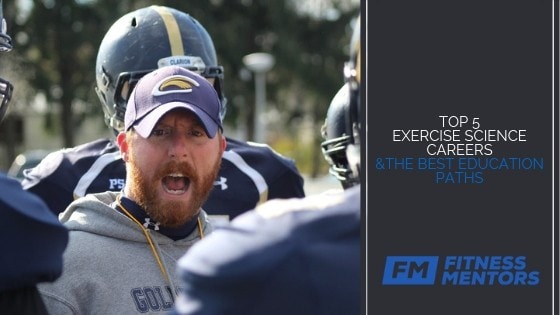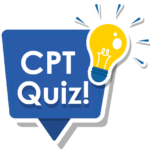Top 5 Exercise Science Careers and The Best Education Paths
Exercise Science describes the study of the body under the stress of exercise including acute and chronic adaptations like the effects on overall health parameters, pathologies, and its potential to reduce, or reverse, disease progression.

Are you considering an Exercise Science degree or asking yourself “what can you do with an exercise science degree?” to help plan for your future?
Whatever your stage in life — consideration, current Exercise Science student, recent grad, or what can you do with a health and exercise science degree?– this post is for you.
As a previous Exercise Science graduate, I can give you a little taste of the college route (as well as other education paths) and provide insight into the options for Exercise Science careers.
But first, let’s define what Exercise Science is.
What is Exercise Science?
Exercise Science describes the study of the body under the stress of exercise including acute and chronic adaptations like the effects on overall health parameters, pathologies, and its potential to reduce, or reverse, disease progression.
Some other areas of study within Exercise Science vertical that you might see at various educational institutes are:
- Kinesiology
- Fitness & Health
- Exercise Physiology
- Biomechanics
- Exercise Nutrition
This foundation prepares students for applied exercise science jobs that integrate science with practical fitness and health applications.
You can also expect a strong educational emphasis in the areas of anatomy, physiology, chemistry, biology, and oftentimes, physics.
What can You Do with an Exercise Science Degree?
If there is one thing I want to emphasize about studying Exercise Science is that the majority of careers in the field require additional graduate school coursework. Yes, that is worth repeating.
Exercise Science is a common prerequisite for graduate level programs in careers such as:
- Doctor (MD)
- Exercise Physiologist
- Registered Dietician
- Occupational Therapist
- Physical Therapist
- Physician Assistant
The important takeaway here is that for most, the bachelor’s degree in and of itself does not get them to the career that they want. Additionally, and as I will get into more below, the career you want might not require a four year college degree in Exercise Science.
However, if you are interested in some of the above careers that require education beyond a B.S. degree, by all means continue on the path that makes the most sense for you.
I emphasize this point because I have met many people who studied Exercise Science in college only to find that they either did not realize they needed additional education to get the career they wanted, or realized there were quicker, more affordable ways to get into the career they wanted.
That said, listed below are some careers that you can get without additional education after your Bachelor’s in Exercise Science degree, including:
- Athletic Director
- Community Program Director
- Massage Therapist
- Recreation and Sports Director
- Sports Coach
- Sports Facility Manager
- Strength and Conditioning Coach
Provided below are the most popular career paths in Exercise Science, which may or may not include a college education, are below.
Top 5 Exercise Science Careers That Pay Well
Personal Trainer
By far, the most common career path chosen by people looking to have an Exercise Science career, as well as who are currently studying Exercise Science, is personal training.
The benefits of a career in personal training are numerous and can even be aligned with that of any of the other careers on this list.
For starters, you don’t need to get a bachelor’s degree to become a personal trainer. In fact, there are five separate ways you can become a personal trainer, ranging from certification from accredited companies, to vocational college, to university programs, to online options, and internal gym programs.
If your heart is set on becoming a personal trainerit certainly would be helpful for you to understand your options for certification beforehand.
Now, I am certainly not knocking university or college-based personal training certification options — I got my B.S. at a university and was a college instructor afterward — but I do understand that it may not be an option for everyone.
But what if you want a career that requires a college degree? Would it still be beneficial to consider a personal training certification?
Let’s say you choose any of the aforementioned education routes for your career in Exercise Science: college degree or not.
Either way, you can benefit from a personal training certification no matter what route you take. If you are wanting to have a career as a personal trainer, you can get certified in as little as two to five months and start making money right away.
If you are in college and are studying Exercise Science, it is still a good idea to get a personal training certification because you can begin gaining experience within your career immediately and can even pay for your education, through your personal training income.
For example, while I was in college I used my personal training certification to my advantage. I was able to train clients around my school schedule given the flexibility of the career. This provided me industry experience, but also allowed me to pay my way through college.
I also became certified as an Online Personal Trainer and trained clients through the internet, which gave me even more freedom to complete my studies and enjoy the college experience.
Top 5 Reasons Personal Training is a Popular Exercise Science Career
So, no matter what your long-term goals are, getting a personal training certificationcan help in the following ways:
- Puts money in your pocket
- Allows you to gain experience in the Exercise Science field
- Helps pay for college (if you are shooting for a B.S., or advanced degree)
- Provides a strong foundation to further your exercise science studies
Top 3 Personal Training Certifications
Below are the best certification options to choose from:
- NASM
- Fitness Mentors
- ACE
It is a well known fact that private personal trainers have the potential to make far more than gym trainers.
Why? Because private personal trainers can set their own rates.
There is a catch for private personal trainers, however, and that is that they have to drum up enough business to write their own paycheck. But before we get into a sample private personal trainer salary let’s define exactly what a private personal trainer is.
A private personal trainer is a trainer that is self-employed, creates their own work schedule, and is free to choose the clients that they work with. For many personal trainers, this is the end goal of their personal training careers and is what sees some trainers working with celebrities and making big bucks.
Unlike gym trainers, private personal trainers don’t get help from the gym or get funneled clients from fitness organizations. They utilize their own networking, sales, and marketing skill sets to drive leads and ultimately generate new clients.
For that reason, many private personal trainers struggle to make a decent income. You can’t simply get a personal trainer certification and expect leads to come your way. (Check out this courseto learn how to build your business and get clients). This is also why so many trainers start out in the gym, get experience, make relationships, begin taking on private clients on the side, and eventually leave the corporate gym environment behind.
How Much Do Private Personal Trainers Make?
A respectable private personal trainer can make upwards of $70,000 per year.
Compare this to the full time salary of a respectable personal trainer at 24-Hour Fitness which would likely fall in the low $40,000 range. And by respectable I mean one with a couple thousand hours of sessions under their belt and training 20-30 sessions per week. This low $40,000 range is also commensurate with what NASM says their average trainer makes.
For example, a 24-Hour Fitness trainer in their middle tier (PT3) makes $13 an hour when training. If you compare a potential salary of an entry-level trainer at 24-Hour Fitness, $22,440/year, to that of a Master Trainer at 24-Hour Fitness, $58,464, and split it down the middle (which is more or less where a PT3 would be), you’d get $40,452.
Now, let’s compare the above salary of a gym trainer to that of a private personal trainer.
The average private personal trainer in the U.S. charges around $50 session. Let’s say this trainer works a total of 30 hours per week and making $1,500 in that time. Multiple this time the weeks in a year, 52, and you have a respectable private trainer who is making $78,000 a year.
Potential Salary of Private Personal Trainer
- Charges $50/session
- Works 30 hours per week (sessions)
- Makes $1,500/week
- Makes $78,000/year
That same trainer can charge $100 a session, work 15 hours a week, and make the same salary.
Gym trainers typically have to work a lot more hours than private personal trainers for a fraction of the salary which is why private training is often the more desirable route. But as we’ll learn, private personal training is not the only way to make money as a trainer outside the gym.
Interested in getting a CPT with an emphasis on entrepreneurship and business development? Check out the FM-CPTfor more info.
Physical Therapist
According to the Bureau of Labor Statistics(BLS), a career in Physical Therapy has some very promising advantages.
Among the highest paying jobs with an exercise science degree, physical therapists earn a handsome amount annually. For starters, the median pay approaches $90,000 per year, is expected to grow 28% by 2016 (which is much faster than average), and consistently ranks as one of the best jobs in healthcare for work-life balance.
Physical therapy jobs tend to require a DPT degree, although some may accept a master’s degree. CostHelper.comsays that doctoral physical therapy degrees can cost $35,000 (such as the doctorate in physical therapy at the University of Illinois at Chicago), or much more for out-of-state students, such as The University of Delaware’s doctoral program which costs over $75,000. That is on top of the money you spend for your bachelors degree.
Athletic Trainer
Athletic trainers also rank high on this list as the profession is similar in scope to that of personal trainers, yet requires a formal bachelor’s degree in a specialized program and the passing of a state licensure exam. Athletic trainers have a median income of $46,630 per year according to the BLS, and have a rapid rate of employment at 23% when looking out to 2016. This career highlights the connection between exercise science careers and salaries, showing how education directly impacts earning potential.
One of the coolest things I find about athletic trainer careers is that they often work alongside athletes within educational settings such as colleges of universities.This often means these professionals are the ones who work hand-in-hand with some of the best up-and-coming athletic talent in the country.
They can also work with younger students, within hospitals, or even for professional sports teams.
Exercise Physiologist
With a median pay of just under $50,000 per year, and a faster than average job outlook, a career in exercise physiology is a popular choice for many looking to put their Exercise Science degree to work. Many roles require advanced education, making it one of the most promising masters in exercise science jobs.
This type of career typically requires a Masters in Exercise Physiology, which on average takes 6 years of total college time as well as requires board certification through the American Society of Exercise Physiologists.
Another interesting aspect of this career is that about half of all exercise physiologists are self-employed. So if you have an entrepreneurial spirit and enjoy the freedom of owning your own business, you may be able to do well in this career.
PE Teacher
According to ZipRecruiter, PE teachers make about $42,500 per year. While this is the lowest salary on this list, you have to remember that these teachers tend to have summers off and benefit from all school holidays as well as teacher pensions.
Typical education requirements for this career include a bachelor’s degree in exercise science as well as a teaching credential or a masters in education. Often times a personal training certification will enhance the likelihood of employment as well.
We also can’t forget that PE teachers get to hang out in gym clothes all day, coach fun sports like kickball and dodgeball, and even be physical fitness role models for many of their students.
Granted there is some give and take for each of the professions on this list in terms of knocking off all the boxes of the most ideal career, but the daily life of the PE coach can be very rewarding.
Boot Camp Instructor
Boot camp instructors are personal trainers who lead group fitness classes that are usually based on military-style training methods. However, in some cases, instructors may unintentionally display behaviors related to relational aggression, such as belittling or excluding participants to create a sense of competition or control. These actions can negatively impact group dynamics and participants’ overall fitness experience.
Exercise Science Degrees and Educational Considerations
As we have learned above, not all careers within Exercise Science require a full-fledged bachelor’s degree. Similarly, we’ve learned that many sought after degrees within Exercise Science require advanced degrees such as master’s or doctoral degrees.
With that in mind below is a comprehensive list of the many careers and their educational obligations. Note that some of these careers may overlap in multiple categories.
Exercise Science Careers that don’t require Degrees
- Personal Training
- Aerobics Instructor
- Fitness Coach
- Gym Manager
- Massage Therapist
- Physical Therapy Assistant
Exercise Science Careers that require Bachelor’s Degrees
- Athletic Director
- Community Program Director
- Kinesiologist
- Massage Therapist
- Athletic Trainer (ATC)
- Physical Education Teacher
- Recreation and Sports Director
- Registered Nurse
- Sports Coach
- Sports Facility Manager
- Strength and Conditioning Coach
Exercise Science Careers that require Master’s or Doctoral Degrees
- Doctor (MD)
- Exercise Physiologist
- Chiropractor (DC)
- Registered Dietician
- Occupational Therapist
- Physical Therapist (DPT)
- Physician Assistant
- Exercise Physiologist
- Physical Rehabilitation
FAQs for Exercise Science Careers and The Best Education Paths
The most common way to make money with an Exercise Science career path is personal training. While personal training doesn’t require a degree, those who get certified are able to put money into their pockets quickly and build a strong foundation for further career advancement.
Exercise Science generally offers courses in Anatomy, Physiology, Kinesiology, and Nutrition. Jobs can range from personal trainers and strength and conditioning coaches to physical therapists and physician assistants – so Exercise Science can be lucrative.
Not quite. Kinesiology is a more broad study that focuses on human movement and its effects on an individual’s health. Exercise Science is a sub-field more fine-tuned into learning and influencing human responses to exercise.
Closing Thoughts on Exercise Science Careers
You should now have a better idea of what you can do in the exciting field that is Exercise Science. For many, a bachelor’s degree at a college or university is the path that they will take to become educated in the many areas of movement and exercise. For others, the bachelor’s is just a stepping stone for a more advanced degree as in the case of physical therapy, physician’s assistant, or doctoral paths. Others may be surprised to learn there are many rewarding careers in Exercise Science that do not require a college degree, and the most popular career in this field, a certified personal trainer, demonstrates that.
When considering your education and career path, keep in mind the following:
- The education required
- The financial commitment
- The time investment
- The typical salary
- Your passion for the career
With these considerations in mind, you should be able to paint a great picture of where you want your career to take you.
What is your experience with jobs and education in the Exercise Science niche? Is there any tip you wish you knew before you started your studies or career? Let us know in the comments.








Bachelor’s degrees will open you up to mid-level jobs in the fitness industry. Examples of these degrees include Bachelor’s in Sports Management, Health Sciences, Nutrition Science, or Health and Wellness. Graduate degrees, like master’s and doctorate, qualify for higher-level positions. These programs might include a master’s in Exercise Science and Wellness or Human Performance, an MBA in Health Care Management, a Ph.D. in Education for Sports Management, or a medical degree in Sports & Athletic Management. While personal training only requires a certification, you can also get an associate’s degree in Exercise Science, giving you a solid foundation to start personal training.